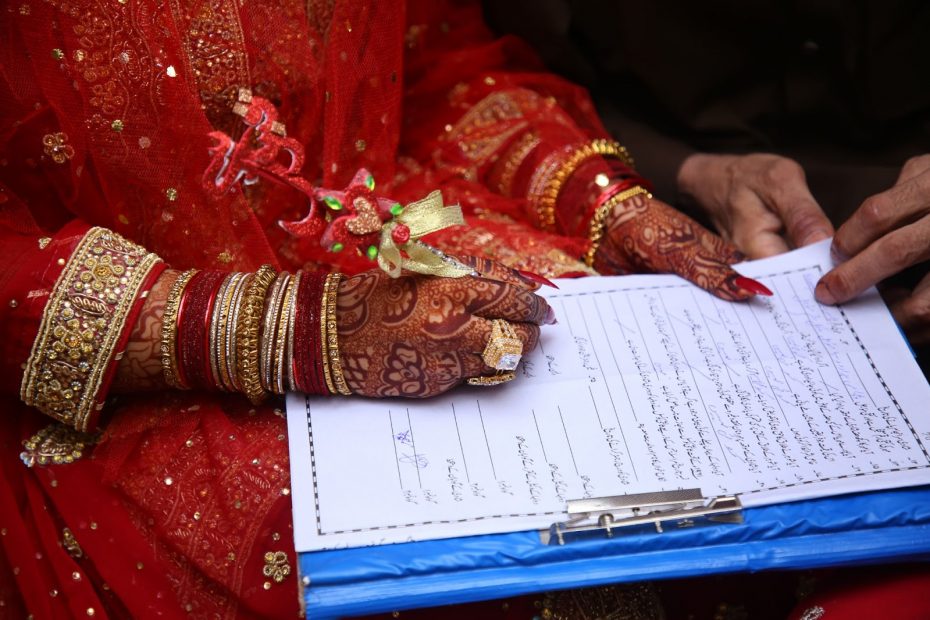Court Marriage Rules In Pakistan
Call Us Now If You Are Interested in Civil Marriage/Court Marriage/Love Marriage: 0333 2316871
Court marriage in Pakistan is a legal and straightforward way for couples to solemnize their union without elaborate ceremonies or religious rituals. It provides a practical solution for teams who wish to marry but face various societal or family challenges. Specific rules and procedures have been established to facilitate court marriages in Pakistan. This guide will delve into Pakistan’s critical court marriage rules, outlining the process, requirements, and legal aspects.
Court Marriage Rules in Pakistan: Eligibility Criteria
Pakistan’s first and foremost court marriage rule involves meeting specific eligibility criteria. Both parties must:
– Be of sound mind and capable of giving their free consent.
– Be at least 18 years old. However, the legal age for marriage can vary depending on personal laws and regional regulations.
– Not be currently married to someone else unless legally divorced or widowed.
– Not be closely related by blood, as marriages between close-blood relatives are prohibited.
Court Marriage Rules in Pakistan: Documentation
Proper documentation is crucial for court marriage in Pakistan. Couples must prepare the following documents:
– National Identity Cards (CNIC) or Computerized B-Forms for proof of identity and age.
– Four passport-sized photographs each.
– Copies of CNICs of two witnesses who will be present during the court marriage.
– Proof of termination of any previous marriage (divorce decree or death certificate if applicable).
Court Marriage Rules in Pakistan: Notice of Marriage
Before proceeding with the court marriage, a notice of marriage must be given to the concerned Marriage Registrar. The notice is usually published at the registrar’s office for a specified period, allowing for any objections from the public.
Court Marriage Rules in Pakistan: Appointment of Marriage Registrar
Select a marriage registrar authorized to perform court marriages in your jurisdiction. You can obtain a list of authorized registrars from the local union council or municipality office.
Court Marriage Rules in Pakistan Procedure
Both parties and their witnesses should visit the marriage registrar’s office on the appointed day. The marriage registrar will verify all the documents and interview both parties separately to ensure their consent and capacity to marry. Once the waiting period is over and no objections have been raised, the court marriage is scheduled.

Court Marriage Rules in Pakistan: Solemnization of Marriage
During the court marriage ceremony, the marriage registrar will read the marriage declaration in the presence of both parties and their witnesses. All parties involved, including the registrar, the couple, and the witnesses, will sign the marriage register. This register is the legal proof of your court marriage.Court Marriage Rules in Pakistan: Marriage Certificate
After the ceremony, the marriage registrar issues a marriage certificate, the official proof of your court marriage. Ensure that all the details on the certificate are accurate, as you may need it for various legal and administrative purposes.Court Marriage Rules in Pakistan: Registration of Marriage
Following the court marriage, it’s essential to register your wedding with the local municipal or civil registrar’s office. Registration ensures that your marriage is legally recognized, and you can obtain an official marriage certificate if you still need one.Court Marriage Rules in Pakistan: Legal and Financial Considerations
Court marriage in Pakistan carries legal and financial implications. Understanding the legal rights and responsibilities that come with marriage is essential. Couples should consider inheritance, joint property ownership, and spousal maintenance.Court Marriage Rules in Pakistan: Post-Marriage Procedures
Once the court marriage is complete, couples should update their official records, including their CNICs, and inform relevant authorities and institutions about their marital status change. This includes banks, employers, and insurance companies.Court Marriage Rules in Pakistan: Role of Witnesses in Court Marriages
In court marriage rules in Pakistan, witnesses play a pivotal role in ensuring the authenticity and legality of the union. Here’s a closer look at their roles and responsibilities:
Witnesses are present during the court marriage ceremony to testify to the authenticity of the marriage. Typically, two witnesses are required, and they must be of sound mind and legal age.
Responsibilities of Witnesses:
Witnessing the consent of both parties: Witnesses are present to confirm that both individuals willingly and freely consent to the marriage. They provide an impartial and objective perspective on the proceedings.
Signing the marriage register: After the marriage ceremony is conducted, witnesses are required to sign the marriage register, along with the marriage registrar and the couple. This act verifies their presence and affirms the marriage’s legality.
Providing their identification: Witnesses must provide their CNICs or other valid identification as part of the documentation process. Their identities are recorded to ensure transparency and legality.
Witnesses need to understand their responsibilities and be prepared to testify if required. Their role is crucial in establishing the legality and authenticity of the court marriage.
Court Marriage Rules in Pakistan: Navigating Interfaith Court Marriages in Pakistan
Interfaith marriages, where individuals from different religious backgrounds choose to marry, are not uncommon in Pakistan. However, they can present unique challenges and considerations due to the diverse religious landscape in the country. Here’s what couples should know when navigating interfaith court marriages:
Court Marriage Rules in Pakistan: Understanding Legal Requirements
In Pakistan, court marriages between individuals of different faiths are legally recognized.
Couples must follow the same court marriage rules and procedures outlined for all marriages.
Ensure that all required documents and paperwork are in order, regardless of religious differences.

Court Marriage Rules in Pakistan: Managing Social and Family Dynamics
Interfaith couples may face societal and familial pressures. It’s essential to communicate openly and honestly with families about your decision.
Seek legal advice if there are concerns about potential legal challenges or obstacles due to religious differences.
Court Marriage Rules in Pakistan: Respecting Individual Beliefs
Pakistan’s constitution guarantees freedom of religion. Both parties in an interfaith marriage should respect each other’s religious beliefs and practices. Consider discussing issues related to religious ceremonies, child upbringing, and other faith-related matters to prevent misunderstandings in the future.
Court Marriage Rules in Pakistan: Legal Protection and Rights of Spouses
One of the critical advantages of court marriages in Pakistan is the legal protection and rights it gives spouses. Here’s an overview of court marriages’ legal aspects and rights.
Court Marriage Rules in Pakistan: Legal Recognition
Court marriages in Pakistan are legally recognized, and the marriage certificate serves as proof of the union. Spouses enjoy legal protection, including inheritance rights, spousal maintenance, and property rights.
Court Marriage Rules in Pakistan: Rights in Case of Separation or Divorce
In the event of separation or divorce, court marriages provide a legal framework for addressing issues such as alimony, child custody, and the division of assets. Couples should consult legal professionals to understand their rights and responsibilities.
Court Marriage Rules in Pakistan: Child Custody and Guardianship
Court marriages establish the legal framework for child custody and guardianship in case of separation or divorce. Child custody decisions are based on the child’s best interests, ensuring their welfare and well-being.
Court Marriage Rules in Pakistan: Court Marriage vs. Traditional Marriage in Pakistan
Choosing between a court marriage and a traditional marriage ceremony is a significant decision for couples in Pakistan. Here, we explore the advantages and disadvantages of each option:
Advantages of Court Marriage:
Simplicity and Efficiency:
Court marriages are relatively straightforward and require minimal documentation and ceremony.
Legal Recognition:
Court marriages are legally recognized, ensuring the rights and protections of spouses.
Privacy and Secrecy:
Court marriages can be conducted discreetly, which may be necessary for couples facing family or societal pressures.
Financial Savings:
Court marriages are often more cost-effective than traditional weddings.
Disadvantages of Court Marriage
Court Marriage Rules in Pakistan: Lack of Traditional Celebrations
Court marriages do not involve elaborate ceremonies and cultural celebrations, which some couples may desire.
Court Marriage Rules in Pakistan: Family and Social Expectations
Traditional weddings are deeply ingrained in Pakistani culture, and not having one may lead to familial and societal disapproval. Ultimately, the choice between a court marriage and a traditional wedding depends on the couple’s preferences, circumstances, and priorities.
Court Marriage Rules in Pakistan: International Recognition of Court Marriages
For couples considering international travel or immigration, it’s crucial to understand the recognition of court marriages conducted in Pakistan abroad. Here’s what you need to know:
Court Marriage Rules in Pakistan: Apostille or Legalization
Court marriage certificates issued in Pakistan may need to be Apostilled or legalized for international recognition. This process involves obtaining an Apostille certificate or undergoing legalization through relevant authorities to confirm the authenticity of the marriage certificate.
Court Marriage Rules in Pakistan: Visa Applications
When applying for spousal visas or immigration to foreign countries, having a legally recognized and internationally accepted court marriage certificate is often a requirement. Consult the embassy or consulate of the destination country for specific requirements related to court marriage documentation.
Court Marriage Rules in Pakistan: Consular Services
The consulate or embassy of your home country in Pakistan can guide the international recognition of court marriages. Be prepared to provide the necessary documentation and certificates for visa and immigration applications. Ensuring that your court marriage certificate is internationally recognized is crucial for couples planning to travel or relocate to another country.
Court Marriage Rules in Pakistan: Changes and Updates in Court Marriage Rules
The rules and regulations regarding court marriages in Pakistan may evolve due to legal amendments or administrative changes. Staying informed about these updates is essential to ensure a smooth court marriage process. Here’s how to keep up-to-date.
Court Marriage Rules in Pakistan: Consult Legal Professionals
Lawyers specializing in family law or matrimonial matters can provide information about recent changes in court marriage rules. Seek legal advice to understand how these changes may impact your court marriage procedure.
Visit Official Government Sources:
Government websites, particularly those of the Union Councils or municipal authorities, often provide updated information on court marriage rules and procedures.
Regularly check these sources for any notifications or changes.
Engage with Marriage Registrars:
The marriage registrar you choose to officiate your court marriage should know the latest rules and requirements. Maintain open communication with the registrar to ensure you follow current guidelines. By staying informed and proactive, couples can navigate any changes in court marriage rules effectively and ensure that their union complies with the most up-to-date legal requirements.
International Recognition of Court Marriages
Exploring the recognition of court marriages conducted in Pakistan in other countries.
The process of obtaining an Apostille or legalization for international use.
Changes and Updates in Court Marriage Rules
Staying informed about any recent changes or amendments in court marriage rules in Pakistan.
The importance of keeping up-to-date with legal requirements and procedures for court marriages.Court marriage rules in Pakistan provide a legally recognized way for couples to unite in matrimony without elaborate ceremonies. Following these rules and procedures ensures the marriage is conducted legally and transparently. However, it’s crucial to consult with your local marriage registrar or legal advisor for the most up-to-date information and guidance regarding court marriages in Pakistan, as the rules may evolve.
